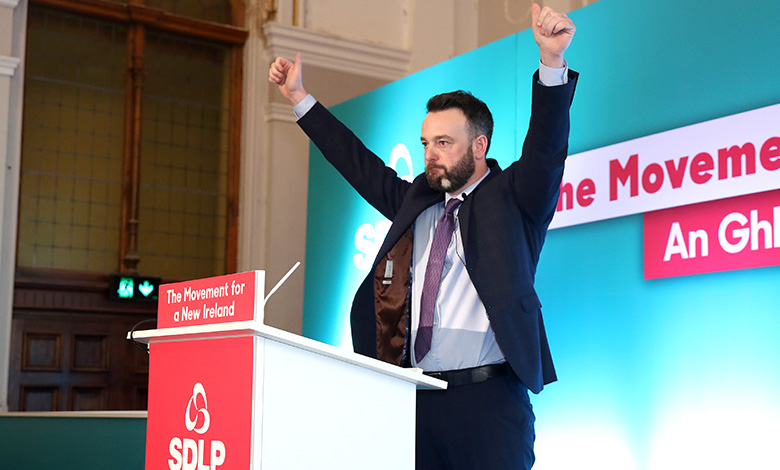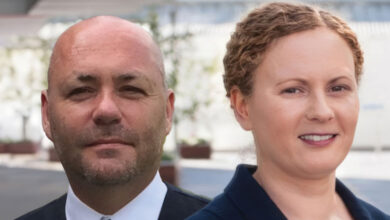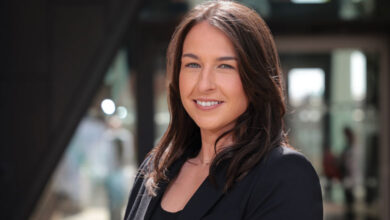Colum Eastwood MP: ‘A new mission’
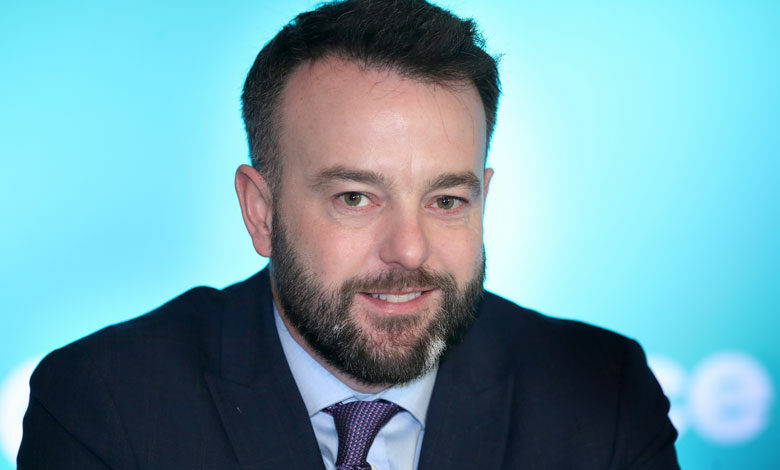
SDLP Leader Colum Eastwood MP tells David Whelan that his party has “a new mission” as a convincer of a new Ireland, countering suggestions of its potential demise amidst prolonged electoral decline.
“The SDLP is here to stay”, Eastwood impressed upon the 200 or so party members gathered in his native Derry for the party’s annual conference at the end of March 2023.
That the SDLP’s leader feels the need to insist on the party’s continued relevance is a sign of the electoral struggles it has experienced in recent years – a significant decline from the position it held 25 years ago as an integral part of securing peace and delivering the Good Friday Agreement.
In the May 2022 Assembly Election, the SDLP lost four of the 12 Assembly seats it held since 2017, slipping from the third largest to the fifth largest party in the Assembly, excluding it from an automatic entitlement to an Executive portfolio.
The announcement of a move into official opposition appeared to be the tonic to Eastwood’s diagnosis that the party had struggled to define itself in the years after the Good Friday Agreement. However, the absence of the institutions has meant little recognisable change for the electorate.
In this context, the mood-music around the upcoming local elections suggests that the SDLP could be set for further disappointment. The tone adopted by Eastwood indicates that he and the party are already bracing themselves for some decline – choosing instead to concentrate on the future.
“We are focused right now on the long term, because we understand that we are in a very difficult political context,” he states.
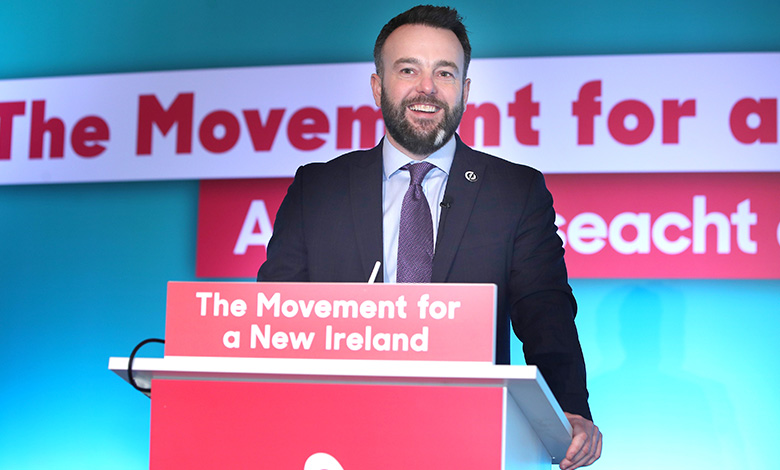 Eastwood’s assessment is that the absence of Stormont, blame for which he levels at the DUP’s unwillingness to serve under a Sinn Féin First Minister, has “starved people of government and power”. The leader’s outlook on the upcoming local election hinges on his assessment that little has changed in this vacuum.
Eastwood’s assessment is that the absence of Stormont, blame for which he levels at the DUP’s unwillingness to serve under a Sinn Féin First Minister, has “starved people of government and power”. The leader’s outlook on the upcoming local election hinges on his assessment that little has changed in this vacuum.
New Ireland
Overall, however, the leader is not downbeat. He firmly believes that the current difficult political context is temporary and used his party’s annual conference at the end of March 2023 to launch its “rebrand”, the conference ‘The Movement for a New Ireland’.
“We have reset our mission to become the convincers for a new Ireland and we are relentlessly focused on that,” he states.
“Post-Brexit, the next number of years is going to be about the constitutional conversation. Those conversations are already happening, but they will heat up, as more and more organisations and the governments see this as a live issue.”
In 2021, the SDLP formally created the New Ireland Commission to “shape its contribution to the debate on constitutional change”. After 18 months of “quiet” conversations with people from a unionist background, the leader says that now is the time for public debate.
“The SDLP passionately believe in a new Ireland, but also believe we can convince people of it,” he says, suggesting that the party is best placed to attract the broadest interaction. “Our history and our pedigree help us to open doors for people to have that conversation that others cannot.”
Quizzed on the work of the Commission to date, Eastwood indicates that it has adopted a deliberately reserved approach, to not only create the space for unionists who might be hesitant to publicly engage on what a future Ireland might look like, but also to allow the SDLP to understand any reticence, as a basis to move forward.
With public engagement events scheduled in every town in Ireland, Eastwood explains this “gear change” by the Commission as a consolidation of public meetings already held in the likes of Belfast, Dublin, London, and Washington.
“We have already set out our six principles for how we are approaching the conversation and we are working with experts to develop policy approaches to how it will all look. In the end, we aim to have a document that will be a prospectus for change.
“Anyone interested in a new Ireland must establish what the best vehicle for achieving it is. I would argue that, even with our diminished electoral performances, we are key to this conversation. If there was not an SDLP, you would have to invent one because I do not think there is anything else out there that does the same job.”
‘Unity curious’
Eastwood believes that the SDLP is better placed to convince those he describes as “unity curious”, outlining his belief that Sinn Féin has little traction beyond its voter base, and pointing to a track record of the SDLP accommodating British traditions.
“One of the biggest things we are hearing back from our engagement with those from a unionist background is concern about how their British tradition will be treated in a new Ireland. When we say we want to see the British tradition respected and celebrated in a new Ireland, we mean it. The Guildhall in Derry is a prime example. After the civil rights movement, the removal of the old Derry Corporation was replaced with power-sharing in the Guildhall, John Hume insisted on it. Today, the Guildhall retains those vestiges of unionist and British symbols.
“When you think of all of the people who transfer their vote to the SDLP who have a different first preference, and you think of all the different political parties across the island who see themselves as close to us, these are relationships which can be marshalled to build a coalition for change,” he says, adding: “I genuinely do not know who else is going to do it.”
Timeframe
On whether the SDLP has put a timeframe on finalising a Irish unification policy, Eastwood describes any call for a border poll currently as “foolish”.
“I am very reluctant to name dates, but I think that within the next decade we will be within that territory of having a border poll,” he says. “However, we intend to have the policy document out long before that, because it needs as much discussion as possible.”
Stormont
Eastwood rejects the suggestion that the party’s focus on a new Ireland sits in contrast to calls to see a functioning Stormont returned. Asked whether he believed Stormont has a future, he says: “I think it does. In the time ahead, we have to run this place and I would rather locally elected people were running it rather than British ministers.”
The SDLP has been vocal on a demand for Assembly reform, including the equalisation of the title of the first ministers, a return to co-nomination of the heads of government, requiring a weighted majority vote, and a new weighted majority vote to appoint a new Speaker. However, Eastwood says that prior to this, the mandate given to Sinn Féin’s Michelle O’Neill must first be respected, adding: “Only then can we have a proper conversation about reform”.
The MP is explicit in his view that Assembly reform does not represent a “silver bullet”.
“What really matters in this regard is attitudes. If there is no desire to change attitudes towards working together then reform will not work.
“I want to see Stormont working but in reality, it is not going to be enough in the longer term for generations of people who feel the peace dividend has not come their way, and they are asking what is next,” he insists.
Windsor Framework
The return of Stormont is currently inhibited by the DUP’s opposition to the Windsor Framework, despite the framework passing through Westminster and being formally adopted by the EU and UK.
While the Stormont stalemate looks set to continue amid DUP opposition, Eastwood believes that the agreement represents progress.
While he expresses the view that the Stormont Brake enhances the potential for deadlock in the Assembly, the MP issues a warning to the DUP about current political realities. “Brexit is done,” he states firmly, adding: “Things have moved on. London and Brussels are no longer talking about Brexit; they are moving on to other challenges like Ukraine, climate change, etcetera. The DUP is finding itself on very narrow ground.
“The DUP needs to figure out where it is going and what its plan is because the conversation about constitutional change is happening. If unionism wants to protect the union, then its leaders should have a positive conversation about that and lay out what they perceive to be the benefits of it.
“We now have dual market access with both the European and British markets, which is something which British MPs in Westminster would give their right arm for. The Scottish and Welsh governments would love to have this. There is an argument that unionism could make around that for the union’s future, but they are not even trying to make it and instead, are embedded in constant negativity which will continue to deliver diminishing returns.”
Looking to the future, Eastwood confirms the focus on the long term but contends that they are prepared for “bumps in the road”.
In the short-to-medium term, he says: “We will see what happens with the local elections, but the next election after that is a Westminster election and I think we have a big job to do retain our two seats and perhaps add to that.
“There is an opportunity to get rid of this Tory Government and as the polls narrow between the Tories and the Labour Party, SDLP votes will count for votes for Keir Starmer against the Tories.”
In the longer term, he adds: “The goal is that we have built a prospectus for change and convinced people that a united Ireland is the best way to run our economy and get better social outputs, particularly for health. We have been really badly served by partition and I really think that there is an opportunity coming to change that.”
On whether he will be the leader driving these long-term ambitions, Eastwood says: “I still feel like there is a big job to do. I turn 40 next year, so I still think I have time to do it. We have a generation of leaders in the SDLP who are roughly the same age and are in this for the long haul and are enthused by this new mission.
“They are inspired by the Good Friday Agreement generation, but they are ready to do the next thing and not be stuck in the past. We have a role to play which will be really important and I am not going anywhere,” he concludes.

